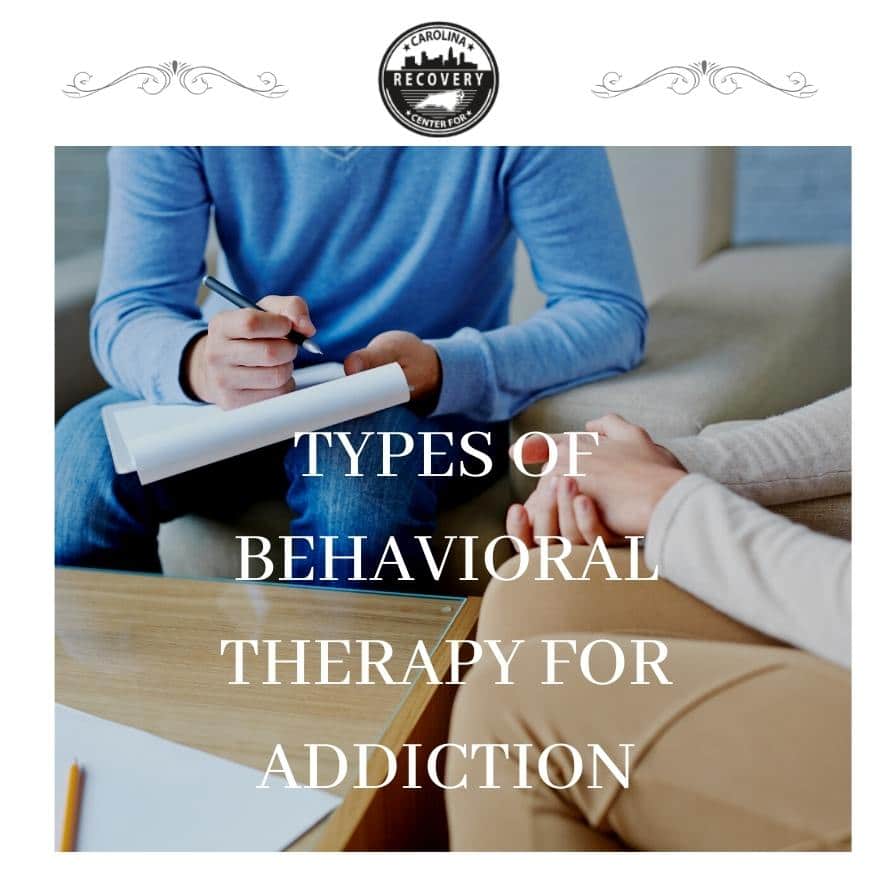Understanding the Different Types of Behavioral Therapy For Addiction

Medically Verified: 2/1/24
Medical Reviewer
Chief Editor

All of the information on this page has been reviewed and verified by a certified addiction professional.
Behavioral therapy is at the heart of most addiction treatment programs in North Carolina. Although other complementary methods like holistic treatment and medication management are vital to recovery, much of the drug and alcohol rehab experience revolves around different types of behavioral therapy.
Behavioral therapies are known to help patients modify their attitudes and behaviors that are related to drug use, thus helping them stay sober. But, there are different kinds that use varying approaches for a specific outcome.
The Role of Behavioral Therapy in Addiction Treatment
There are many ways to treat addiction, but behavioral therapy has been used in drug and alcohol rehab centers since the very beginning. Behavioral therapies can be offered in individual, group, or family sessions. These therapies work by:
- Offering individualized treatment that differs based on each patient’s unique needs
- Keeping patients engaged in the treatment process
- Providing incentives for people to stay sober or stay in treatment
- Helping change the attitudes and behavior of patients
- Helping patients evaluate their thoughts, ideas, beliefs, and attitudes
- Increasing life skills that are needed for sobriety
- Promoting healthy communication skills
- Encouraging patients to think about old problems in new ways
There are many different types of behavioral therapy used in addiction treatment. Below we will look at each therapeutic approach and how they help patients overcome drug and alcohol abuse.[1,2]
Cognitive Behavioral Therapy (CBT)
Cognitive-behavioral therapy (CBT) is one of the most widely practiced psychotherapies. This strategy revolves around the idea that maladaptive behavioral patterns and learning processes play a critical role in one’s substance abuse and recovery. As such, CBT helps patients identify and fix problematic behaviors by practicing a new set of skills that can be used to help prevent relapse. CBT also helps patients anticipate future problems, gain self-control, and develop effective coping strategies for sobriety. These skills can be implemented into daily life to help patients maintain abstinence.
Dialectical Behavioral Therapy (DBT)
Dialectical behavioral therapy (DBT) is a form of CBT that is effective at treating people with mental illness or suicidal thoughts. It can help patients resolve harmful behaviors by promoting mindfulness, stress regulation, self-awareness, and interpersonal relationships. DBT is one of many types of behavioral therapy that is used to treat individuals with co-occurring mental illness and addiction.
Rational Emotive Behavior Therapy (REBT)
Rational emotive behavior therapy (REBT) is another type of behavior therapy that is similar to CBT. Its goal is to help patients identify harmful thought patterns and belief systems that are self-defeating. And, it helps patients replace irrational beliefs with logical beliefs. REBT is thought to help patients identify their emotions and behaviors, take responsibility for their actions, and adopt healthier expectations.
Contingency Management (CM)
Contingency management (CM) is one of several types of behavioral therapy in which patients are rewarded for achieving their goals or making positive changes. Patients may receive things like vouchers, prizes, or positive reinforcements for healthy behaviors or milestones in sobriety. CM can help increase treatment retention rates because it incentivizes patients to better themselves. It can also increase a person’s chances of staying sober after rehab.
Motivational Interviewing (MI)
Motivational interviewing (MI) is another approach that revolves around incentives, however, MI encourages patients to stay sober by identifying their internal motivations and values. As clients begin valuing their sobriety, they will reward themselves for good behavior and accomplishments. MI can help patients make better decisions, stay in treatment longer, and remain sober after rehab.
Couples or Family Behavior Therapy
Couples or family therapy is designed to address addiction and how it relates to a person’s intimate relationships, either with a partner or family member(s). A person’s actions and recovery are affected by his or her relationships, and those relationships are affected by a person’s actions. As a result, family therapy strives to improve relationships by addressing issues like enabling, communication, living environments, and more. It also teaches loved ones of alcoholics and addicts how to best support their loved ones in recovery.
Start Behavioral Therapy for Addiction Treatment in North Carolina Today
These different types of behavior therapy help provide an intensive and personalized approach to addiction treatment. Not only do they help motivate and engage patients in their recovery, but they also incentivize them to stay sober. Here at Carolina Center for Recovery, our team implements a range of behavioral and holistic therapies to provide a whole-patient approach.
If you or someone you know is struggling with addiction, it’s time to get help. A simple phone call can get you connected with a substance abuse counselor in North Carolina who can help you find the right treatment program for you. Don’t wait any longer. Contact us today.
References:

